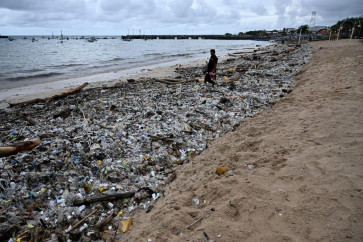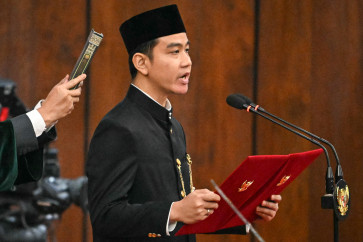JFX aims Rp 50b in daily sharia trading
The Jakarta Futures Exchange (JFX) launched sharia-compliant commodity contracts on Thursday with a target of Rp 50 billion (US$5
Change text size
Gift Premium Articles
to Anyone

T
he Jakarta Futures Exchange (JFX) launched sharia-compliant commodity contracts on Thursday with a target of Rp 50 billion (US$5.65 million) in daily transactions.
JFX director Bihar Sakti Wibowo said that the new trading contracts would allow sharia banks to improve their liquidity management, besides other instruments, such as sukuk (Islamic bonds).
“This is an alternative for sharia banks to manage their liquidity and if it works well, they will be able to handle their liquidity more effectively,” he told reporters after a ceremony to launch the sharia-based commodites contracts.
Bihar said that for the initial phase, the exchange would issue contracts on five of Indonesia’s major agricultural products, including cacao, Arabica coffee, low grade coffee, peeled and raw cashew nuts, while other potential commodities, such as crude palm oil, palm oil product olein and coal, were slated to be added in the near future.
“At the beginning, three sharia banks – Bank Syariah Mandiri, Bank HSBC Amanah and Bank Muamalat – would participate in the trading,” he said, adding that JFX expected to complete processing applications in November, and 10 further banks, including BNI Syariah and Bank Permata Syariah would soon take part in the trading.
According to Bihar, for supervision, the JFX will team up with the sharia supervisory board of the Indonesian Ulema Council (MUI) to check available stocks provided by commodity suppliers in compliance with regulations approved by the Commodities Exchange Supervisory Board (Bapepti).
The sharia-compliant commodity contracts are backed by a fatwa on sharia-based commodity trading, which allows sale transactions of physical commodities, issued by the MUI supervisory board in August.
The contracts refer to similar contracts in other parts of the world, such as gold contracts issued by the Dubai Multi Commodities Center, tin contracts by the London Metal Exchange, and crude palm oil contracts by the Malaysia Derivatives Exchange, which apply Islamic principles and platforms supported by banks.
Trade Minister Mari Elka Pangestu said that as the world’s largest producer of various commodities with the biggest market potential for sharia finance, Indonesia had to make the best use of its position to improve its competitiveness at the global level.
“We are optimistic that sharia commodity trading will benefit not only sharia banking, but also producers of commodities, which will see higher incomes. The movement of sharia banking along with commodity producers will finally support the real sector and contribute to the economy,” she said.
Mari said that commodity trading had grown significantly, with this year’s trading rising by 726 percent from last year’s. However, she said, the contribution of physical transactions, or primary commodities, to the JFX trading was still low.
“The challenge we face is how to increase the contribution of these transactions, since their contribution to the trading transactions in the JFX is still low. [An increased contribution] is what we expect from the issuance of these sharia commodities,” she said.
Indonesia, the world’s most populous Muslim-majority country, has intensively applied Islamic banking in recent years.
According to recent data, the country’s Islamic banks managed the third funds totaling Rp 5.7 trillion in 2003, which rose to Rp 89.8 trillion as of July this year. It channeled Rp 5.5 trillion in funds in 2003, which had jumped to Rp 88 trillion in July this year.
Bank Syariah Mandiri’s retail banking director Hanawijaya expected the transactions could also be conducted by conventional banks so that there would be wider market access.









